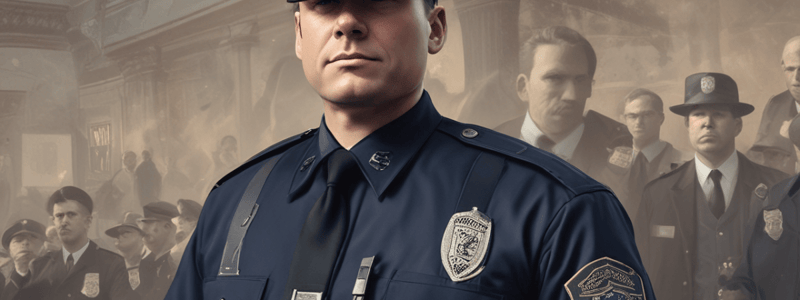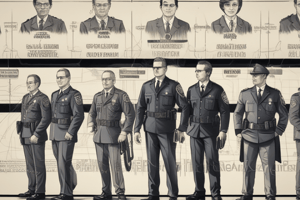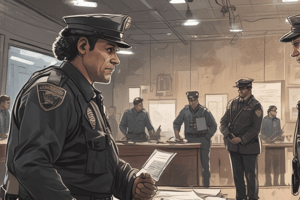Podcast
Questions and Answers
What is the primary purpose of mentoring subordinates as a new officer?
What is the primary purpose of mentoring subordinates as a new officer?
- To establish personal friendships within the unit
- To help subordinates understand the impact of their actions on their career (correct)
- To ensure policy is enforced strictly without compromise
- To duplicate the previous officer's leadership style
Which approach should a new officer take when needing to clarify relationships and enforce policies?
Which approach should a new officer take when needing to clarify relationships and enforce policies?
- Communicate openly and establish clear professional boundaries (correct)
- Use a punitive method to reinforce authority
- Avoid making any changes to existing relationships
- Maintain a casual approach to keep the team relaxed
What potential issue can arise from attempting to replicate the previous officer's behavior?
What potential issue can arise from attempting to replicate the previous officer's behavior?
- Increased camaraderie within the unit
- Resentment and loss of respect for the new officer (correct)
- Enhanced understanding among crew members
- Improved team cohesion and respect
How can a new officer effectively implement change within a unit?
How can a new officer effectively implement change within a unit?
What must a new officer do to overcome resistance to change from personnel accustomed to old ways?
What must a new officer do to overcome resistance to change from personnel accustomed to old ways?
Why is it vital for a new officer to be aware of generational differences within the crew?
Why is it vital for a new officer to be aware of generational differences within the crew?
What can happen if a new officer fails to maintain a positive public image for themselves and the department?
What can happen if a new officer fails to maintain a positive public image for themselves and the department?
What is a common pitfall for new officers when faced with established traditions in their unit?
What is a common pitfall for new officers when faced with established traditions in their unit?
What is a primary responsibility of a new company officer regarding their actions?
What is a primary responsibility of a new company officer regarding their actions?
Which quality is essential for effective communication between a new officer and unit members?
Which quality is essential for effective communication between a new officer and unit members?
How can the relationship between a new officer and unit members change during an emergency response?
How can the relationship between a new officer and unit members change during an emergency response?
What can hinder a new officer's acceptance in their role?
What can hinder a new officer's acceptance in their role?
What is a potential challenge when an officer is promoted from within their organization?
What is a potential challenge when an officer is promoted from within their organization?
Why is ethical conduct particularly important for a new officer?
Why is ethical conduct particularly important for a new officer?
What is often a misconception among unit members regarding a new officer's position?
What is often a misconception among unit members regarding a new officer's position?
What key factor influences the ability to take and give orders in mixed role environments?
What key factor influences the ability to take and give orders in mixed role environments?
Study Notes
Officer Challenges in Leadership and Supervision
- Developing leadership skills is essential for ensuring unit safety, effectiveness, and efficiency.
- Officers must model ethical behavior, as they serve as role models for peers and subordinates.
- Transitioning from being supervised to supervising can be overwhelming for new company officers.
- Officers must take responsibility for actions taken by themselves and their subordinates.
- Understanding the extent of authority assigned to their position is crucial for fair application.
Relationship Changes
- Promotion from unit member to leader transforms relationships with peers into supervisor-subordinate dynamics.
- Excellent interpersonal skills are vital for effective communication and appropriate leadership practices.
- Emergency responses challenge relationship dynamics, requiring quick decision-making and adherence to assignments.
- Safety concerns raised by subordinates should be prioritized over strict leadership during emergencies.
- In mixed employment settings, role exchange may occur, necessitating mutual respect and adaptability.
Perception Shifts
- New company officers are often perceived differently due to their role, which can affect their relationships with unit members.
- Perceptions are subjective, influenced by emotions and rumors, potentially complicating the officer’s leadership.
- Previous friendships may lead subordinates to expect leniency regarding organizational policies.
Organizational "Tattoos"
- Early career actions can significantly impact a firefighter's reputation, likened to a lasting "tattoo."
- Officers should mentor subordinates on the importance of their behavior, as it shapes long-term perceptions.
- Negative behaviors may tarnish not only personal reputations but also the organization’s image in the community.
- Officers must recognize that their conduct can influence future promotion opportunities.
Managing Change and Group Dynamics
- Clarifying the new supervisory role and enforcing policies fairly are critical for unit morale and function.
- Maintaining true friendships without compromising professional boundaries is necessary to avoid negative situations.
- New officers need to adapt their leadership style based on each unit member's needs through observation and communication.
- Changes in personnel dynamics might provoke resentment if previous behaviors are imitated.
- Officers should communicate expectations and priorities while acknowledging crew members' diverse backgrounds.
Navigating Organizational Traditions
- New officers may face resistance encapsulated in the phrase "We never did it that way before."
- To facilitate change, officers should articulate the benefits of new policies or practices for the crew and the wider community.
Studying That Suits You
Use AI to generate personalized quizzes and flashcards to suit your learning preferences.
Description
A police officer faces various challenges, including leadership, ethics, and supervision, as they transition into a new role. Effective leadership, ethical conduct, and strong supervision are crucial for a unit to operate safely and efficiently.




